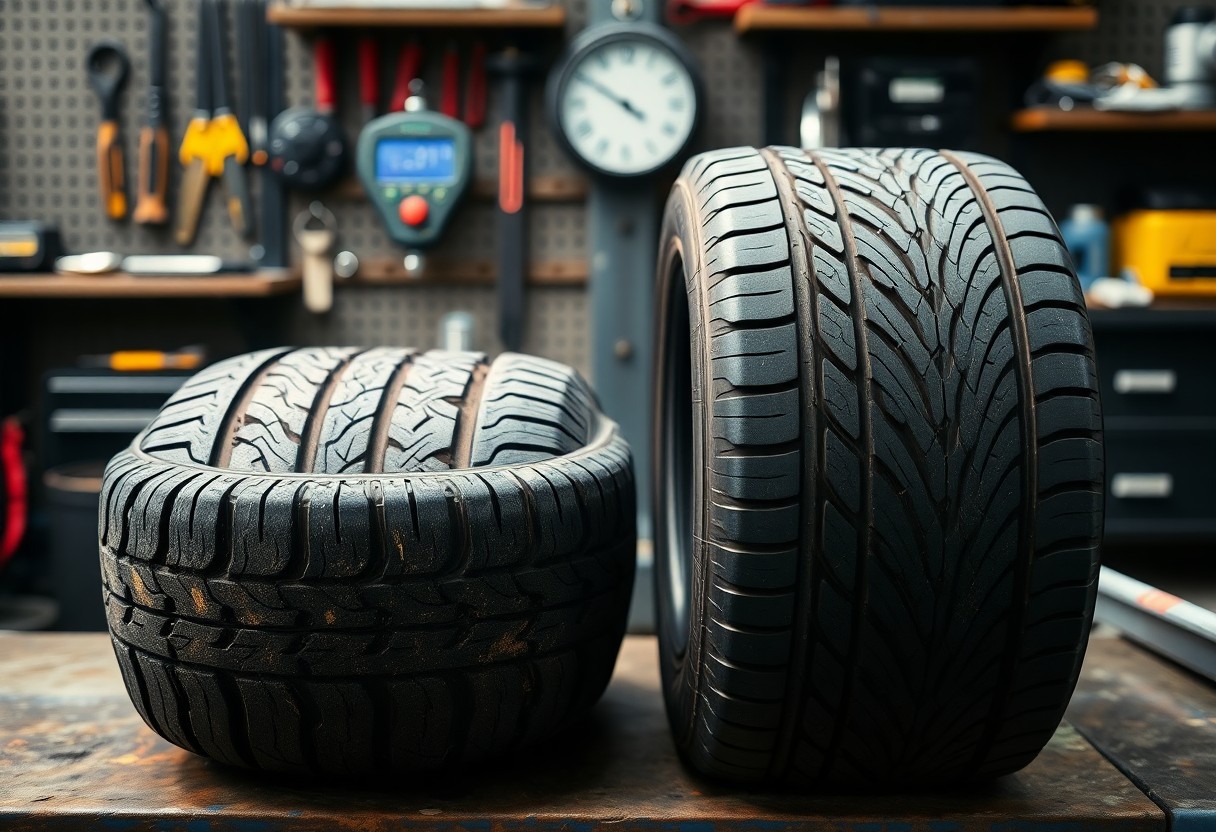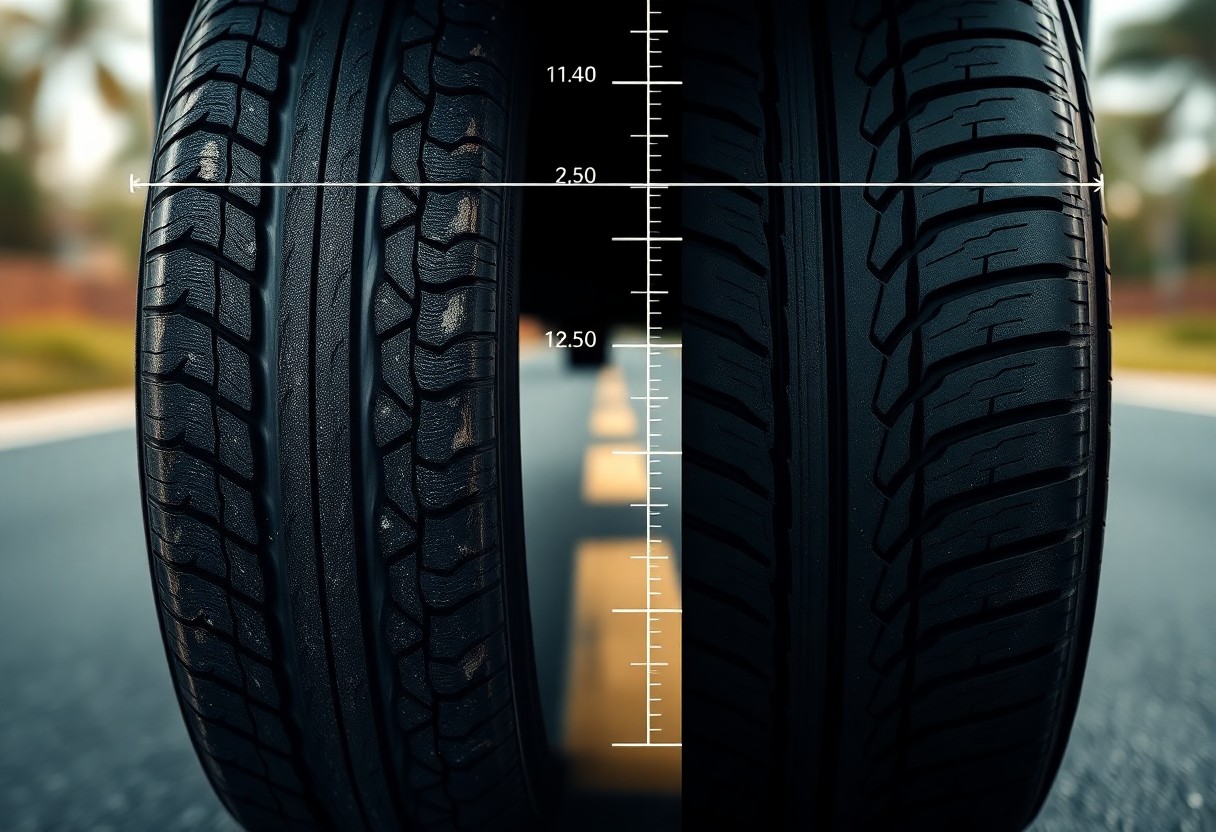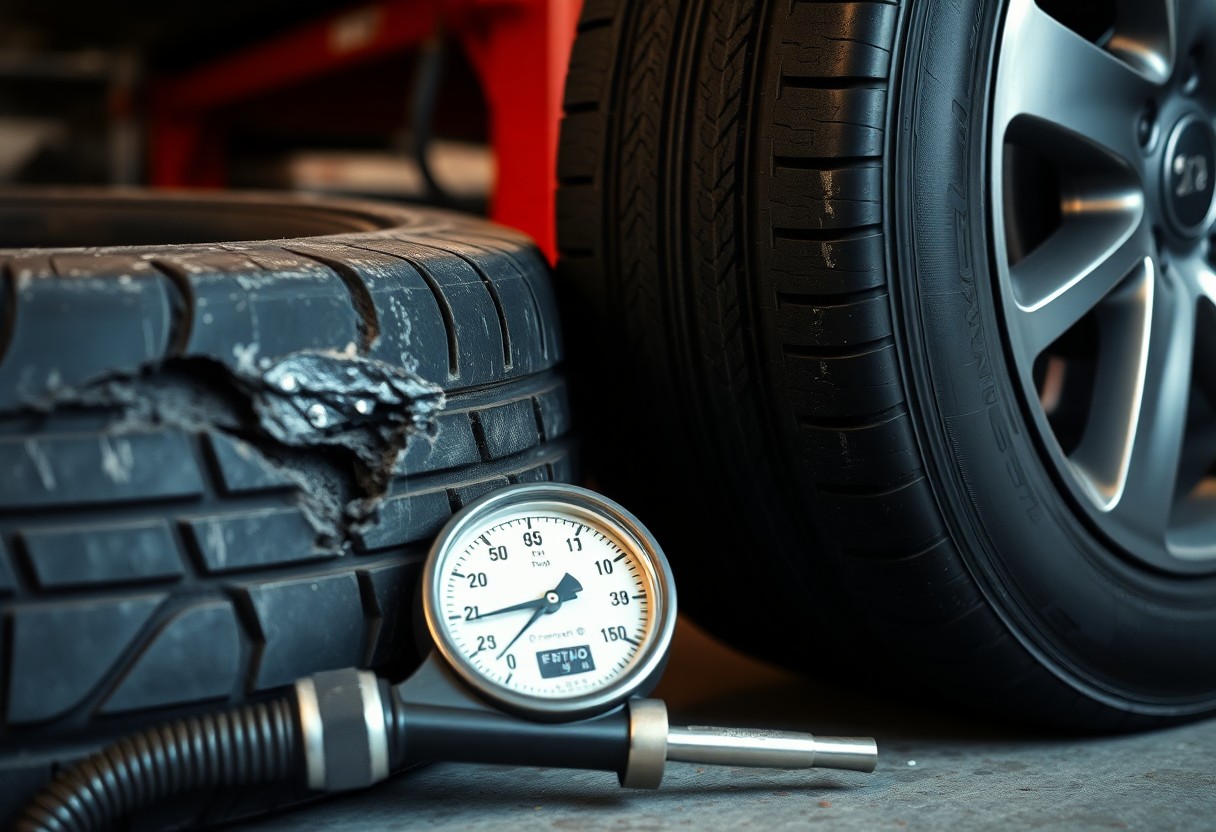It’s imperative to understand that cheap tyres often lack the high-quality materials and advanced technology found in branded tyres. As a result, you may notice that they wear out faster, compromising both your safety and vehicle performance. Cheaper options typically sacrifice durability and grip, leading to increased stopping distances and a higher risk of blowouts. Investing in reliable, branded tyres not only enhances your vehicle’s handling but also offers better long-term savings through reduced replacements and maintenance costs.

Key Takeaways:
- Material quality in branded tyres is generally superior, leading to better durability.
- Manufacturing processes for branded tyres often include advanced technology, enhancing performance.
- Cheap tyres may use lower-grade rubber, increasing wear rates under stress.
- Branded tyres often feature better tread designs that improve grip and longevity.
- Economical tyres may lack adequate quality control, resulting in inconsistent performance.
- Branded tyres typically offer better resistance to environmental factors, reducing wear.
- Warranties and guarantees on branded tyres reflect their long-term reliability and lifespan.
The Economics of Cheap Tyres: Understanding the Price-to-Quality Ratio
Choosing cheap tyres might seem like a wise economic decision, but the reality is often different. While the upfront cost is lower, you may end up spending more in the long run due to factors like increased wear and the necessity for more frequent replacements. A cheaper tyre may cost you half of a top-branded option, but if it wears out twice as fast, your initial savings vanish quickly. Understanding the price-to-quality ratio is key to making financially sound choices for your vehicle.
Raw Material Savings and Their Impact on Longevity
Manufacturers of cheap tyres often cut corners by using inferior raw materials, which significantly impacts durability. By opting for lower-quality compounds and less robust construction methods, these tyres may offer a tempting price but fall short on lifespan. Quality materials enhance grip and resilience, enabling the tyre to handle road stress better, prolonging its life on the asphalt. In contrast, the use of subpar materials leads to quicker degradation, meaning you’ll find yourself replacing them sooner than expected.
Hidden Costs of Cheap Tyres: What You Might Not See
Considering cheap tyres might save you cash upfront, but the hidden costs can accumulate swiftly. Poor performance in wet or icy conditions can lead to increased risk of accidents, adding expenses for insurance claims or medical bills. Furthermore, substandard tyres may result in decreased fuel efficiency, costing you more at the pump. These financial factors often make cheap tyres a false economy.
Without obvious signs, the hidden costs of cheap tyres can have a lasting impact on your finances and safety. For instance, studies have shown that inadequately designed tread patterns can reduce grip by up to 30% in wet conditions, dramatically increasing stopping distances and the likelihood of accidents. Additionally, when you factor in the potential for increased fuel consumption—reportedly an extra 10% due to rolling resistance—the savings you initially anticipated can easily evaporate, turning your bargain tyres into a costly mistake.
The Material Science Factor: Why Composition Matters
Tyre composition significantly impacts performance and longevity. Cheap tyres often utilize lower-grade materials, leading to reduced resilience and durability. The molecular structure of rubber, the quality of fillers used, and the presence of additives dictate the tyre’s ability to withstand wear, temperature fluctuations, and stress. High-quality tyres are engineered with advanced compounds that enhance grip and extend lifespan, making them a more economical choice in the long run.
Comparing Rubber Quality: Cheap vs. Branded Tyres
| Cheap Tyres | Lower-grade rubber with limited durability, prone to cracking and faster wear. |
| Branded Tyres | High-quality rubber compounds provide better performance, resistance to wear, and longer life. |
The Role of Tread Design and Performance
Tread design influences not only the aesthetics but also the handling, traction, and overall performance of your vehicle. Cheap tyres typically feature simplistic, less effective tread patterns that compromise grip, especially in wet or uneven conditions. In contrast, branded tyres incorporate advanced tread designs optimized for specific driving conditions. Features such as sipes and grooves improve water evacuation and enhance contact with the road, reducing the risk of hydroplaning and offering enhanced safety. Investing in quality tread design directly impacts your driving experience and tyre longevity.
Manufacturing Processes: The Cost of Cutting Corners
In the race to keep costs down, manufacturers of cheap tyres often cut corners in their production processes. They may reduce the quality of materials, skip specialized treatments, and employ outdated techniques, leading to a product that fails to meet industry standards. The result is a tyre that not only wears quicker but also poses safety risks, as compromised structural integrity under extreme conditions can lead to blowouts and accidents.
Production Standards: Why Branded Tyres Are Built to Last
Branded tyres adhere to stringent production standards, ensuring they undergo rigorous testing for durability and performance. These manufacturers invest in advanced technologies, high-quality materials, and improved production techniques that enhance the longevity of their products. For instance, many branded tyres feature enhanced tread designs and compounds that provide optimal grip and resistance to wear, allowing you to drive confidently.
Quality Control Measures: Ensuring Durability
Quality control is a hallmark of reputable tyre manufacturers, employing comprehensive testing protocols to guarantee durability. Each tyre typically undergoes extensive inspections, including dimensional checks, material analysis, and performance assessments under various conditions. This ensures that only tyres meeting strict quality benchmarks make it to market, helping you avoid the frequent replacements associated with cheaper alternatives.
In a typical production run for branded tyres, over 50 quality control checkpoints verify aspects such as air pressure resistance and uniformity in tread patterns. Many companies utilize advanced quality management systems that employ statistical process control to identify anomalies early in the manufacturing cycle. This meticulous approach reduces the likelihood of defects reaching consumers, instilling confidence in the durability and reliability of your tyres. Ultimately, investing in quality tyres not only enhances your safety but also proves more economical in the long run.

Real-World Performance: The Statistical Differences
Statistical analyses reveal a significant performance gap between cheap and branded tyres. Branded tyres typically exhibit more consistent wear patterns and higher durability, extending their lifespan by an average of 20-30%. In contrast, cheap tyres often show erratic wear, sometimes resulting in replacement within 15,000 to 20,000 miles, compared to branded options lasting upwards of 50,000 miles under similar conditions.
Analysing Wear Rates: Data from Field Tests
Field tests demonstrate noticeable differences in wear rates, with branded tyres displaying a wear resistance of up to 50%. In controlled environments, branded options retain optimal tread depth significantly longer, providing better traction and handling. This variance leads to less frequent replacements, ultimately saving you money and ensuring safer driving conditions.
Safety Concerns: The Broader Implications of Frequent Replacement
Frequent tyre replacements can pose serious safety risks, as inconsistent tread depths and degraded performance impact vehicle handling and braking distances. Each replacement cycle increases the risk of encountering tyre failure, which can lead to dangerous accidents. Furthermore, driving on worn-out tyres compromises traction, particularly in adverse weather conditions.
Frequent tyre replacements not only disrupt your budget but also elevate the likelihood of dangerous driving situations. As worn tyres lose their grip, the risk of hydroplaning in wet conditions or diminished stopping power becomes pronounced. Statistically, a vehicle equipped with lower-quality tyres is 3 times more likely to experience a blowout or loss of traction. This correlation signifies an urgent need to consider how your choice of tyres affects not just your wallet but also your overall safety on the road.

Maintenance and Care: How Use Affects Tyre Lifespan
Your tyre lifespan greatly depends on the care you provide. Regularly checking tyre pressure, ensuring proper alignment, and rotating your tyres can significantly extend their life. You should also avoid overloading your vehicle, as excessive weight leads to increased wear and tear. Keeping your tyres clean and free from debris will help maintain their integrity, preventing premature deterioration. This attention to maintenance can result in better performance and safety on the road.
Proper Care Techniques for Different Tyre Types
Different tyre types require specific maintenance techniques to ensure optimal performance. For instance, all-season tyres benefit from periodic rotation every 6,000 to 8,000 miles, while performance tyres should be monitored closely for wear due to their softer compound. Regularly inspecting for cuts or punctures is equally necessary across tyre types. Keeping track of tread depth with a simple gauge can alert you to replacements before serious issues arise. This attention pays off in the form of extended tyre life.
- Check tyre pressure monthly
- Rotate tyres every 6,000 to 8,000 miles
- Inspect tread depth regularly
- Avoid overloading your vehicle
- Clean tyres to remove debris
| Tyre Type | Care Techniques |
|---|---|
| All-Season Tyres | Rotate every 6,000 miles |
| Performance Tyres | Monitor for wear frequently |
| Winter Tyres | Check grip and patterns seasonally |
| Off-Road Tyres | Inspect for punctures after use |
| Economy Tyres | Regular pressure checks are key |
Perception Vs. Reality: User Experiences with Cheap vs. Branded Tyres
User experiences often highlight a divide between expectations and reality regarding cheap and branded tyres. Many drivers initially opt for cheap tyres due to appealing price points; however, feedback reveals that performance and safety can be compromised. For instance, a study indicated that drivers using branded tyres reported significantly fewer instances of blowouts and improved road handling compared to those with budget alternatives. This disparity in real-world performance can impact driving comfort and safety.
Survey data from tyre users shows that while a significant number gravitate towards cheaper options, those who invested in branded tyres often cited better longevity and overall driving satisfaction. Drivers reported that branded tyres provided superior grip during adverse weather conditions, adding a layer of safety that cheap tyres typically lack. The blindness to potential hazards posed by budget tyres becomes evident in user anecdotes of longer stopping distances and handling issues. Ultimately, the initial savings on cheap tyres may lead to higher costs in replacements and safety risks down the line.
Conclusion
Conclusively, you may find that cheap tyres wear out faster than branded tyres due to inferior materials and manufacturing processes. The lower quality compounds used in budget tyres often lead to reduced performance and quicker degradation, especially under demanding driving conditions. Additionally, branded tyres typically undergo more rigorous testing and quality controls, ensuring they provide better longevity and safety. By investing in reputable brands, you enhance your vehicle’s performance and contribute to a better driving experience overall.
FAQ
Q: Why do cheap tyres wear out faster than branded tyres?
A: Cheap tyres often use lower-quality materials and manufacturing processes, leading to reduced durability and quicker wear.
Q: What materials are commonly used in cheap tyres?
A: Cheap tyres commonly use less resilient rubber compounds and fewer quality control measures, resulting in lower performance and shorter lifespan.
Q: How does tread design affect tyre wear?
A: Branded tyres typically feature advanced tread designs that enhance grip and reduce uneven wear, while cheap tyres may lack these innovations, leading to faster degradation.
Q: Are there differences in warranty between cheap and branded tyres?
A: Yes, branded tyres often come with comprehensive warranties that cover wear and defects, while cheap tyres usually have limited or no warranty protection.
Q: Does brand reputation play a role in tyre longevity?
A: Brand reputation often reflects extensive research and development, resulting in tyres that are engineered for longevity, unlike many cheap alternatives.
Q: How do manufacturing standards affect tyre performance?
A: Branded tyres are produced under stricter manufacturing standards, ensuring consistency in quality and performance, whereas cheaper tyres may cut corners in production.
Q: Can the price of a tyre indicate its quality?
A: Generally, a higher price point often correlates with better quality materials and performance capabilities, suggesting that cheaper tyres may compromise on necessary factors.
